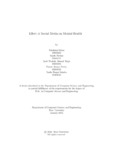| dc.contributor.advisor | Chakrabarty, Dr. Amitabha | |
| dc.contributor.author | Islam, Tahshinul | |
| dc.contributor.author | Farhan, Tajish | |
| dc.contributor.author | Ahmed Turjo, Syed Thakdir | |
| dc.contributor.author | Pretty, Nusrat Jaman | |
| dc.contributor.author | Sababa, Tasfia Haque | |
| dc.date.accessioned | 2024-01-17T08:09:29Z | |
| dc.date.available | 2024-01-17T08:09:29Z | |
| dc.date.copyright | 2023 | |
| dc.date.issued | 2023-01 | |
| dc.identifier.other | ID: 19101202 | |
| dc.identifier.other | ID: 18101312 | |
| dc.identifier.other | ID: 18101484 | |
| dc.identifier.other | ID: 18101582 | |
| dc.identifier.other | ID: 18301082 | |
| dc.identifier.uri | http://hdl.handle.net/10361/22177 | |
| dc.description | This thesis is submitted in partial fulfillment of the requirements for the degree of Bachelor of Science in Computer Science and Engineering, 2023. | en_US |
| dc.description | Cataloged from PDF version of thesis. | |
| dc.description | Includes bibliographical references (pages 19-20). | |
| dc.description.abstract | An online community where people work together to produce, share and change
their ideas and comments about any data is known as web-based social network ing. Over the past ten years, long-distance social networking purpose of connecting
has profoundly changed how people interact and collaborate. This study aims to
evaluate how social media expanded and opened doors to making social correlations
that might add to psychological wellness challenges. It included inquiries for de mographic data, an example of long-range interpersonal communication use, social
relationships, and well-being impacts. A descriptive study examined responses from
793 adults to a self-created questionnaire with four sections that was sent using the
Google survey tool. In order to develop a paradigm concerning the Chi-Squared
test has been used to know about the relationships between social networking site
use and the three different categories of psychological distress which are depression,
anxiety, loneliness. Previously, different methodologies and theories have been used
to know about the effects of social media on mental health. We have tried using the
supervised learning classifiers such as Random forest, Decision Tree, SVN, KNN,
ADA Boost, Na¨ıve bayes and Voting classifier on the data set pertaining to the use
of social networking sites and mental health issues which was dynamically examined.
Among those classifiers we chose the best results with the highest accuracy and f1
scores as these results can tell us how much false positives and false negatives we
get. Depending on the scores, we found that SVN classifier delivered the best results
with an average accuracy score of 38% for depression, 48% for anxiety and 65% for
loneliness and an F1 scores of 28%, 42% and 44% respectively. | en_US |
| dc.description.statementofresponsibility | Tahshinul Islam | |
| dc.description.statementofresponsibility | Tajish Farhan | |
| dc.description.statementofresponsibility | Syed Thakdir Ahmed Turjo | |
| dc.description.statementofresponsibility | Nusrat Jaman Pretty | |
| dc.description.statementofresponsibility | Tasfia Haque Sababa | |
| dc.format.extent | 20 pages | |
| dc.language.iso | en | en_US |
| dc.publisher | Brac University | en_US |
| dc.rights | Brac University theses are protected by copyright. They may be viewed from this source for any purpose, but reproduction or distribution in any format is prohibited without written permission. | |
| dc.subject | Social media | en_US |
| dc.subject | Mental health | en_US |
| dc.subject.lcsh | Social media--Psychological aspects. | |
| dc.subject.lcsh | Information technology--Social aspects. | |
| dc.title | Effect of social Media on mental health | en_US |
| dc.type | Thesis | en_US |
| dc.contributor.department | Department of Computer Science and Engineering, Brac University | |
| dc.description.degree | B.Sc. in Computer Science and Engineering | |

